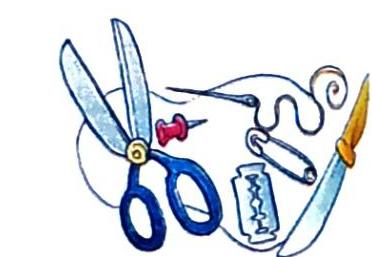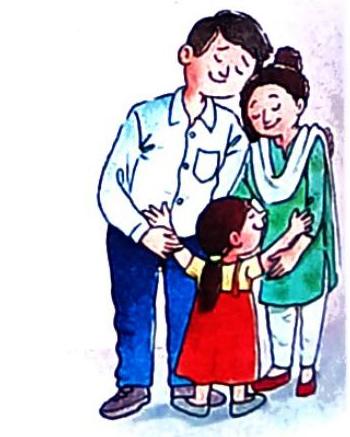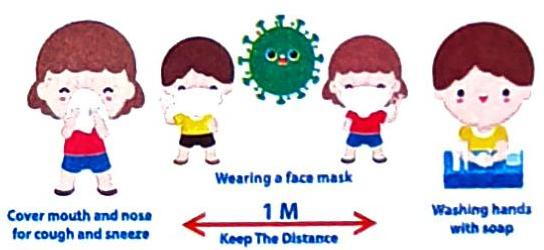Chapter: 08. Safety At Home And At School
Safety at Home and at School
Let’s learn about…
This chapter will teach you important things about staying safe! You will learn:
Safety rules to follow in different places: About personal safety, which means keeping yourself safe. How to understand the difference between a good touch and a bad touch. Key Terms
Here are some important words you will learn in this chapter:
Safety: The condition of being protected from danger or harm. Rules: Instructions that tell you what you are allowed or not allowed to do. Personal Safety: Protecting yourself from risky or dangerous situations to stay safe. Good Touch: A touch that makes you feel happy and safe, like a hug from your parents. Bad Touch: A touch that makes you feel uncomfortable, scared, or unhappy, or when someone hits or pushes you.
Safe Surroundings
Accidents can be small or big, and they can happen at any time. It’s really important to always be careful to avoid accidents. To do this, we must follow safety rules to keep ourselves safe.
Safety rules at home
We must follow specific safety rules to stay safe in our house.
Always handle sharp objects like scissors, knives, and needles with great care. Always ask an adult to help you when using these items. When you are finished, do not leave them lying around. Leaving them around can accidentally hurt you or someone else.
Make sure your room is always tidy. Keep your toys and books in their proper places. Someone might trip over things left on the floor and get hurt. Be very careful in the kitchen. Do not go near a cooking stove. Going near a stove can cause you to suffer burns. Keep the bathroom floor dry. A wet floor can cause someone to slip and get hurt. Do not touch electrical gadgets and switches with wet hands. Touching them with wet hands can give you an electric shock. Never take any medicine without first asking your parents. Never fly kites on the terrace or sit on the terrace wall. You might slip and fall from a height. Do not play with matches. FactPedia
Helmets are very important safety equipment. They help keep us safe while riding on a bicycle, motorbike, and scooter by protecting our heads.
Safety while using mobiles and computers
It’s important to follow safety rules when using mobile phones and computers to protect your health and privacy.
Do not carry mobile phones in your shirt pockets. Do not keep your mobile phone next to your bed at night. These practices are not good for your health. Do not use the mobile phone while it is charging. Do not use mobile phones for too long at a time. Always sit straight when you use the computer. Good posture is important. Do not work on the computer for too long at a time. Using the computer for too long affects your eyes and neck. Internet Safety: Do not give out your e-identity (like your email or username) or share your photographs with strangers on the Internet. This protects your personal information. Green Earth
You can help stay safe if your environment is clean and safe. Keeping your surroundings clean is a good practice.
Computer Energy Saving: Switch off the computer once you are done using it. Do not keep it on standby mode, as this wastes energy and can affect the computer’s lifespan. DIY
There are dangers wherever we go, but we can try to keep ourselves safe by being alert to warning clues. These clues tell us when something might be unsafe. For example, smelling smoke warns us about fire.
Safety at school
Following safety rules at school helps keep everyone safe and prevents accidents.
Do not run around in the classroom. You might run into the sharp edges of benches and hurt yourself. Do not climb on desks and chairs. You might fall and get hurt. Never throw or play with sharp objects like pencils, rulers, or compasses. Always walk in a queue (a line). Do not push or hit others. Never run in the corridor or up or down a staircase. While working in a laboratory, handle the equipment and chemicals with care. Gadget: A small machine or device.
In the school bus
Following safety rules on the school bus ensures a safe journey for everyone.
Boarding the Bus: Always board a bus in a queue (a line). Movement on Bus: Do not stand or walk around while the bus is moving. Windows: Never put your head or hand out of the window. Noise: Never scream in a moving bus, as it may disturb the driver and lead to accidents. Getting On/Off: Wait for the bus to stop completely before boarding or getting off the bus.
In the playground
Playing is fun, but we must follow safety rules in the playground to avoid injuries.
Fair Play: Always play fair and follow the rules of the game. Pushing: Do not push others while playing. Wet Areas: Do not play in wet areas. You might slip and hurt yourself. Turns: Always wait for your turn on the slides and swings.
Personal Safety
Personal safety means protecting yourself from risky or dangerous situations to stay safe.
Strangers: We must not speak to strangers. Uncomfortable Situations: If you feel uncomfortable with anybody, whether you know them or not, speak to an elder in your family whom you trust.
Good touch or bad touch
Understanding good touch and bad touch is crucial for your personal safety.
There are four parts of your body that should not be touched by anybody, except your mother. These parts are your lips, your chest, your bottom, and the part between your legs. These are called your private parts. Your body belongs to you, and no one has the right to touch these parts, even a doctor, unless your parents are present. A good touch from your close ones makes you feel happy. A hug from your parents is an example of a good touch.
Sometimes, when someone hits you or pushes you, it is a bad touch. People who often do this are called bullies. A bully usually picks on children who are weak or different by hitting them or calling them names. What to Do if You Experience Bad Touch or Bullying: If you ever see bullying happening, you should tell your teacher. If you do not feel safe when someone touches you, you may: Speak to your parents, your teacher, or someone you feel safe to talk to. Remember that you always have a right to protect yourself and keep yourself safe.
Stay safe
It is very important to take good care of ourselves, especially when there is an outbreak of a disease, like during the time of the Coronavirus.
When a disease is spread by coughing and sneezing, we need to wear a mask covering our nose and mouth. We must wash our hands properly with soap to keep them clean and free from germs. We must not shake hands with people. We must maintain distance from people.
In a Nutshell
Here’s a quick summary of what we’ve learned about safety:
Accidents can happen at any time, so it’s important to always be careful. Following safety rules helps keep us safe at home, at school, in the playground, and on the bus. Never give out your identity (like personal details) to strangers on the Internet. Always protect your body from a bad touch. If someone’s touch makes you uncomfortable, you should run away, shout for help, or tell someone you trust right away.
 Self Study
Self Study








